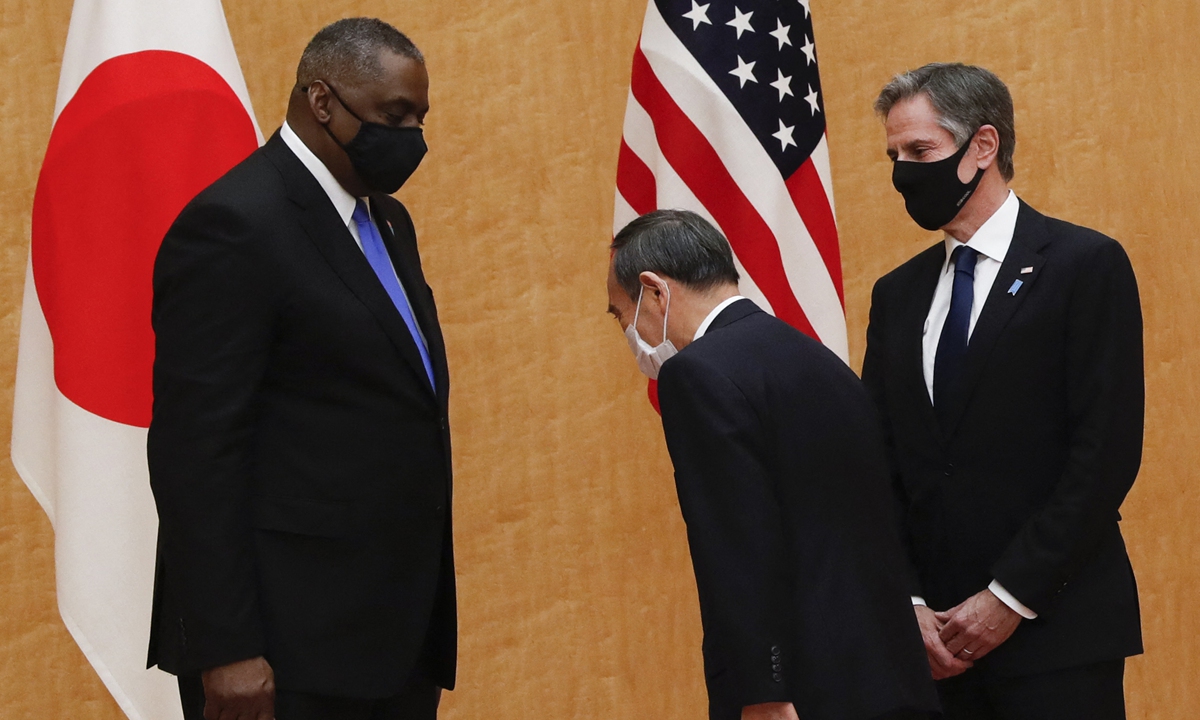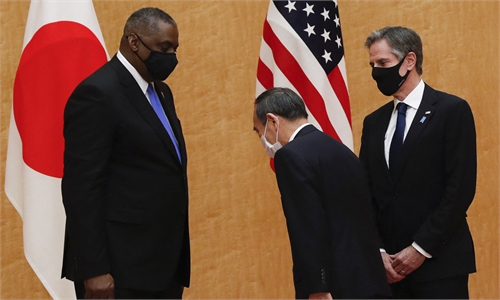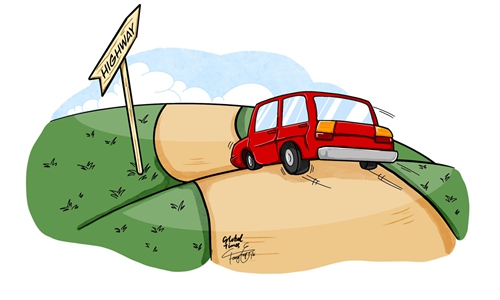Strategically short-sighted Japan is easily enticed by short-term gains

Japanese Prime Minister Yoshihide Suga greeted US Secretary of State Antony Blinken and US Defense Secretary Lloyd Austin. Photo: AFP
Japan has been quite noisy recently in terms of China affairs. In coordinating moves with the US, it has ratcheted up maneuvers such as meddling in issues of Taiwan, Hong Kong and Xinjiang, all China's internal affairs and demonizing China's coast guard law, all of which are attempts to contain China.
This shows Japan's lack of independence in its diplomacy and the profound influence the US can exert on it. Japan has always been restrained by the US in many agendas such as Japan's diplomacy and China-Japan relations. Even in the Japan-US alliance, despite calls for an equal relationship from both sides, the posture of Japan leaning toward the US has never changed.
Japan tried to be diplomatically independent and act like a major power during the rule of former prime minister Shinzo Abe. But such independence and the ambition of being a major power were subject to US global strategic planning. As strategic competition between China and the US becomes increasingly intense, the shortfall of Japan's lack of independence is clear - it is still deeply influenced by US strategic arrangement and pressure.
The shift of Japan's attitude toward China is clearly shown in its latest round of anti-China moves. Japan remained tepid toward China and did not initiate major provocations in China relations during the latter stage of Abe's rule. When delivering his first policy speech since taking office, Japanese Prime Minister Yoshihide Suga said a stable relationship between China and Japan is essential and that he hopes to cooperate with China on common issues. What prompted the shift of Japan's attitude?
First, Suga was supposed to inherit Abe's policies at the very beginning of his tenure. But faced with blows from the ravaging COVID-19 pandemic, the tough task of economic recovery and the bumpy process to host the Olympic Games, his support base has become shaky and his approval rate is sliding. At this moment, hyping China agendas can shift the Japanese public's criticism away from his cabinet.
Second, the Biden administration is skilled in dealing with relations with allies. Biden stresses cooperation within multilateral mechanisms, and Japan is an important partner in this. The US has imposed pressure on Japan regarding China's domestic issues and the territorial disputes between China and Japan, which made Japan take radical approaches in China relations.
The Japanese invasion of China in history deeply hurt China. Now China has become more powerful than Japan, but Japan treats China with unwarranted prejudice. The US conquered Japan during World War II, and now Japan still serves as a pawn of the US. Japan's diplomacy in nature is subordination to power. The rule of strength has been deeply rooted in Japan's diplomacy since the Meiji Restoration - it attaches to whoever is in power. This is particularly shown in the Japan-US alliance.
Japan is a strategically short-sighted country. It should be able to see that China's rise is unstoppable, but it is still easily enticed by short-term gains. It only deems China's rise and China's economic development as a military and security danger, but ignores China's future role in stabilizing East Asia and even the entire Asia-Pacific.
Now Japan has clearly chosen to stand by the US. The biggest loss for Japan is that its status as a major power will not be lifted as it wishes, because a Washington-leaning Tokyo will not have independent policies. In East Asia, if a power wants to win respect from regional countries, a precondition is that it should not act as a willing puppet of the US.
Last year, 15 Asia-Pacific nations signed the Regional Comprehensive Economic Partnership. If the US was included in the negotiations, probably the pact couldn't have been signed even now. The Japan-led Comprehensive and Progressive Agreement for Trans-Pacific Partnership was signed after the US withdrew. Japan is clear about the US' role as a destabilizing factor in regional economic cooperation.
China-Japan relations haven't come to the lowest point yet. The lowest point in bilateral relations since the two established diplomatic ties took place when former prime minister Junichiro Koizumi made several visits to the Yasukuni Shrine and when Japan illegally nationalized the Diaoyu Islands. Judging from the current situation, there is buffer room.
Australia serves as a lesson. But the degree of their dependence on China and their geographic closeness to China is different. As neighbors, China and Japan have deep economic, historical and cultural relations. It remains to be seen if Japan will become the next one in the region that ties itself to the US chariot regardless of the consequences.
The author is an associate research fellow at the Center for Japanese Studies, Fudan University. opinion@globaltimes.com.cn



